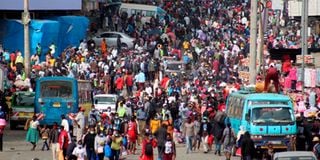Premium
Covid-19 fatigue hits Kenyans as many flout rules

Nairobi residents go about their business at Gikomba market with little regard to Covid-19 guidelines.
In the current health crisis, all it takes is for a few people to flout the rules and entire communities at put at risk of infection.
A dive into the daily lives of Kenyans by Healthy Nation, specifically Nairobians, revealed that with pandemic fatigue, the Covid-19 prevention guidelines issued by the Health ministry are being ignored.
After 15 months of dealing with the coronavirus and losing jobs and family members to the virus, experts say it is understandable that Kenyans are getting tired of the regulations and policies that have come with the virus.
The World Health Organisation (WHO) describes pandemic fatigue as demotivation to follow recommended protective behaviours, emerging gradually over time, and affected by a number of emotions, experiences and perceptions.
The Covid-19 prevention guidelines, which were drafted in accordance with the WHO recommendations, require the wearing of masks, frequently washing hands with running water and soap or using sanitiser and maintaining social distance, among others.
Pandemic burnout
So serious is the pandemic fatigue that the WHO has raised concern saying that it could lead to pandemic burnout.
WHO says it considers pandemic fatigue an expected and natural reaction to the prolonged nature of the crisis and the associated inconvenience and hardship. But, it adds, this poses a serious threat to efforts to control the spread of the virus.
“Public support and protective behaviours remain critical for containing the virus. The gains that each nation collectively achieved through lockdowns and other measures – sometimes at high social and economic costs – must be safeguarded,” says WHO.
Muthurwa market
It is Wednesday morning at the Muthurwa market in Nairobi and with the hustle and bustle, one would think that there is no pandemic raging given the number of people walking in and out of the market.
Here, Kenyans in their hundreds come to earn their daily bread or buy agricultural produce for homes or businesses, rubbing shoulders with each other with little care about what is going on in the world.
It is clear that their biggest concern is to make money to feed their families after being cooped up in their homes for months unable to make a decent living.
The same goes for many Kenyans who have suffered mental and financial difficulties owing to the pandemic, their faces a tale of their determination to recoup all they have lost since March last year, especially during the lockdowns.
The flyover leading to Ngara market is no different; men and women swarm the market every morning.
No masks
Here, most traders sell their wares without wearing masks or providing clean water and soap for their customers, who do not seem bothered by this as they as they go about buying one thing or another.
At Kariakor market, traders and buyers mingle in the crowded market without a care in the world. Most of them are not wearing masks and have no way of adhering to the social distancing rule.
A little further from here, at the Railways station, people seem to have adopted the do-not-care attitude that seems to have taken over the country’s capital as they walk around with no masks and no regard to social distancing.
Despite the fact that all matatus are expected to provide hand sanitiser for their passengers before they board, none of the vehicles’ crews did so, and some did not even check temperatures.
In order to prevent contamination, the protocols require that 14-seater matatus carry only eight passengers, while vehicles that carry more than 30 passengers should carry no more than 60 per cent of their capacity. This, however, is not the reality on the ground.
No social distancing
Despite the buses at the Kencom station adhering to this rule, those waiting to board the buses do not maintain social distance.
The buses that ply the Kawangware route start off well with the required number of passengers. However, once they get to Chaka, a little past Kilimani Police Station, they are filled to capacity.
Aside from the transport sector, the restaurant business and nightlife seem to have gone back to normal as most hotels in the capital do not adhere to the guidelines.
The restriction of movement between 10pm and 4am, which has been in place for some time, is also not adhered to in most places, with many clubs and bars now operating past said hours, this despite the fact that they are required to close at 7pm.
A night out in Kilimani and Lang’ata areas reveals that most bars and clubs remain open into the curfew hours, with patrons locked inside.
Brunches in clubs
A popular club in Lang’ata, which is open on Sunday afternoon, barely follows the regulations on social distancing and so is a popular club on Chiromo lane that hosts Sunday brunch.
Many clubs have taken to hosting brunches on weekends to make money yet they make no effort to ensure that people adhere to social distancing or wearing of masks.
In schools, there is barely any social distancing. Some do not even take the temperatures of the children walking in or follow up on whether they have washed their hands.
A spot check in two schools in Nairobi revealed that pre-schoolers were not social distancing. In fact, the children took afternoon naps together after eating lunch together at their small desks.
Kenya Medical Practitioners, Pharmacists and Dentists Union (KMPDU) secretary-general Davji Atellah said the pandemic fatigue has hit a high.
“People are tired, even health workers. However, the virus does not get tired and we see new variants coming up, yet we seem to have dropped our guard,” said Dr Atellah.
Politicians
He added that politicians, especially, are guilty of this as they hold rallies without wearing masks.
“There is no way you can social distance in those rallies and as we have seen, the rallies are filled with people who have little concern for social distancing or even wearing masks.”
In a study published in January in the Journal of the American Medical Association (Jama), a team of researchers analysed national survey responses collected between April and November 2020 about adherence to Covid-19 rules such as social distancing, frequent hand-washing and wearing a mask.
In April, respondents reported following these measures about 70 per cent of the time. By June, adherence dropped to the high 50s, and increased slightly to an average of 60 per cent by November. The decrease was consistent across every region in the country.
Don’t give up
Dr Francis Kuria, the head of Public Health at the Ministry of Health, said that while it is true that people are getting tired of the protocols, it is important not to give up because that will only lead to getting infected and, in the worst case, dying.
“You get fatigued and die, otherwise everyone needs to remain vigilant and stick to the rules set out because that is the only way we can save ourselves. It is unfortunate that you go to pubs and see them crowded, you see touts hanging in matatus without masks,” he said.
The reason why people are tired, Dr Kuria said, is that they did not expect the pandemic to last this long. He added that it is time they braced themselves for the long haul given the new variants that keep popping up.
“The ministry is doing everything it can to ensure that it conducts risk communication without scaring them because this is a global thing. As much as they thought it is a flu that lasts for a few months, it is expected to be here with us for a long time given the new variants that bring about new waves,” he said.
The flouting of the protocols comes at a time when a new variant of the coronavirus has been detected in 20 countries, raising alarm over possible third and fourth waves across the world.
Delta Plus variant
The Delta Plus variant, a sub-variant of the Delta variant that was first detected in India, has now been detected in South Korea.
The variant, which has been blamed for the current rise of infections in the United States, has been detected in two patients in South Korea who are already vaccinated with the AstraZeneca vaccine.
A mutation called “K417N” is what distinguishes Delta Plus from the Delta variant.
According to the Korea Herald, one patient had no history of travel while the other patient returned from the United States on July 23 and had tested positive during an airport screening.
According to a report by the US Centres for Disease Control and Prevention, the Delta variant is as transmissible as chickenpox, and patients with breakthrough infections of the variant may be able to spread it as readily as those who are not vaccinated.





